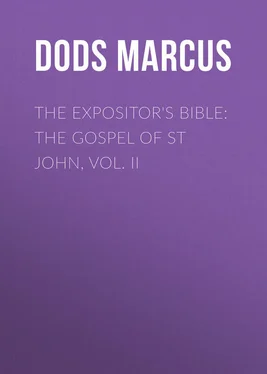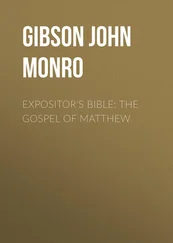Marcus Dods - The Expositor's Bible - The Gospel of St John, Vol. II
Здесь есть возможность читать онлайн «Marcus Dods - The Expositor's Bible - The Gospel of St John, Vol. II» — ознакомительный отрывок электронной книги совершенно бесплатно, а после прочтения отрывка купить полную версию. В некоторых случаях можно слушать аудио, скачать через торрент в формате fb2 и присутствует краткое содержание. Издательство: Иностранный паблик, Жанр: foreign_religion, foreign_antique, foreign_prose, на английском языке. Описание произведения, (предисловие) а так же отзывы посетителей доступны на портале библиотеки ЛибКат.
- Название:The Expositor's Bible: The Gospel of St John, Vol. II
- Автор:
- Издательство:Иностранный паблик
- Жанр:
- Год:неизвестен
- ISBN:нет данных
- Рейтинг книги:5 / 5. Голосов: 1
-
Избранное:Добавить в избранное
- Отзывы:
-
Ваша оценка:
- 100
- 1
- 2
- 3
- 4
- 5
The Expositor's Bible: The Gospel of St John, Vol. II: краткое содержание, описание и аннотация
Предлагаем к чтению аннотацию, описание, краткое содержание или предисловие (зависит от того, что написал сам автор книги «The Expositor's Bible: The Gospel of St John, Vol. II»). Если вы не нашли необходимую информацию о книге — напишите в комментариях, мы постараемся отыскать её.
The Expositor's Bible: The Gospel of St John, Vol. II — читать онлайн ознакомительный отрывок
Ниже представлен текст книги, разбитый по страницам. Система сохранения места последней прочитанной страницы, позволяет с удобством читать онлайн бесплатно книгу «The Expositor's Bible: The Gospel of St John, Vol. II», без необходимости каждый раз заново искать на чём Вы остановились. Поставьте закладку, и сможете в любой момент перейти на страницу, на которой закончили чтение.
Интервал:
Закладка:
This, then, being the law of human life, Christ, being man, must not only enounce but observe it. He speaks of Himself even more directly than of us when He says, “He that loveth his life shall lose it.” His disciples thought they had never seen such promise in His life as at this hour: seedtime seemed to them to be past, and the harvest at hand. Their Master seemed to be fairly launched on the tide that was to carry Him to the highest pinnacle of human glory. And so He was, but not, as they thought, by simply yielding Himself to be set as King and to receive adoration from Jew and Gentile. He saw with different eyes, and that it was a different exaltation which would win for Him lasting sovereignty: “I, if I be lifted up, will draw all men unto Me.” He knew the law which governed the development of human life. He knew that a total and absolute surrender of self to the uses and needs of others was the one path to permanent life, and that in His case this absolute surrender involved death.
A comparison of the good done by the life of Christ with that done by His death shows how truly He judged when He declared that it was by His death He should effectually gather all men to Him. His death, like the dissolution of the seed, seemed to terminate His work, but really was its germination. So long as He lived, it was but His single strength that was used; He abode alone. There was great virtue in His life – great power for the healing, the instruction, the elevation, of mankind. In His brief public career He suggested much to the influential men of His time, set all men who knew Him a-thinking, aided many to reform their lives, and removed a large amount of distress and disease. He communicated to the world a mass of new truth, so that those who have lived after Him have stood at quite a different level of knowledge from that of those who lived before Him. And yet how little of the proper results of Christ’s influence, how little understanding of Christianity, do you find even in His nearest friends until He died. By the visible appearance and the external benefits and the false expectations His greatness created, the minds of men were detained from penetrating to the spirit and mind of Christ. It was expedient for them that He should go away, for until He went they depended on His visible power, and His spirit could not be wholly received by them. They were looking at the husk of the seed, and its life could not reach them. They were looking for help from Him instead of themselves becoming like Him.
And therefore He chose at an early age to cease from all that was marvellous and beneficent in His life among men. He might, as these Greeks suggested, have visited other lands and have continued His healing and teaching there. He might have done more in His own time than He did, and His time might have been indefinitely prolonged; but He chose to cease from all this and voluntarily gave Himself to die, judging that thereby He could do much more good than by His life. He was straitened till this was accomplished; He felt as a man imprisoned and whose powers are held in check. It was winter and not spring-time with Him. There was a change to pass upon Him which should disengage the vital forces that were in Him and cause their full power to be felt – a change which should thaw the springs of life in Him and let them flow forth to all. To use His own figure, He was as a seed unsown so long as He lived, valuable only in His own proper person; but by dying His life obtained the value of seed sown, propagating its kind in everlasting increase.
II. The second point suggested is, that the proper value of Christ’s life consists in this – that it propagates similar lives. As seed produces grain of its own kind, so Christ produces men like Christ. He ceasing to do good in this world as a living man, a multitude of others by this very cessation are raised in His likeness. By His death we receive both inclination and ability to become with Him sons of God. “The love of Christ constraineth us, because we thus judge that if one died for all, then all died; and that He died for all, that they which live should not henceforth live unto themselves, but unto Him that died for them.” By His death He has effected an entrance for this law of self-surrender into human life, has exhibited it in a perfect form, and has won others to live as He lived. So that, using the figure He used, we may say that the company of Christians now on earth are Christ in a new form, His body indeed. “That which thou sowest, thou sowest not that body which shall be, but bare grain: but God giveth it a body as it hath pleased Him, and to every seed his own body.” Christ having been sown, lives now in His people. They are the body in which He dwells. And this will be seen. For standing and looking at a head of barley waving on its stalk, no amount of telling would persuade you that that had sprung from a seed of wheat; and looking at any life which is characterised by selfish ambition and eagerness for advancement and little regard for the wants of other men, no persuasion can make it credible that that life springs from the self-sacrificing life of Christ.
What Christ here shows us, then, is that the principle which regulates the development of seed regulates the growth, continuance, and fruitfulness of human life; that whatever is of the nature of seed gets to its full life only through death; that our Lord, knowing this law, submitted to it, or rather by His native love was attracted to the life and death which revealed this law to Him. He gave His life away for the good of men, and therefore prolongs His days and sees His seed eternally. There is not one way for Him and another for us. The same law applies to all. It is not peculiar to Christ. The work He did was peculiar to Him, as each individual has his own place and work; but the principle on which all right lives are led is one and the same universally. What Christ did He did because He was living a human life on right principles. We need not die on the cross as He did, but we must as truly yield ourselves as living sacrifices to the interests of men. If we have not done so, we have yet to go back to the very beginning of all lasting life and progress; and we are but deceiving ourselves by attainments and successes which are not only hollow, but are slowly cramping and killing all that is in us. Whoever will choose the same destiny as Christ must take the same road to it that He took. He took the one right way for men to go, and said, “If any man follow Me, where I am there will he be also.” If we do not follow Him, we really walk in darkness and know not whither we go. We cannot live for selfish purposes and then enjoy the common happiness and glory of the race. Self-seeking is self-destroying.
And it is needful to remark that this self-renunciation must be real. The law of sacrifice is the law not for a year or two in order to gain some higher selfish good – which is not self-sacrifice, but deeper self-seeking; it is the law of all human life, not a short test of our fidelity to Christ, but the only law on which life can ever proceed. It is not a barter of self I make, giving it up for a little that I may have an enriched self to eternity; but it is a real foregoing and abandonment of self for ever, a change of desire and nature, so that instead of finding my joy in what concerns myself only I find my joy in what is serviceable to others.
Thus only can we enter into permanent happiness. Goodness and happiness are one – one in the long-run, if not one in every step of the way. We are not asked to live for others without any heart to do so. We are not asked to choose as our eternal life what will be a constant pain and can only be reluctantly done. The very heathen would not offer in sacrifice the animal that struggled as it was led to the altar. All sacrifice must be willingly made; it must be the sacrifice which is prompted by love. God and this world demand our best work, and only what we do with pleasure can be our best work. Sacrifice of self and labour for others are not like Christ’s sacrifice and labour unless they spring from love. Forced, reluctant, constrained sacrifice or service – service which is no joy to ourselves through the love we bear to those for whom we do it – is not the service that is required of us. Service into which we can throw our whole strength, because we are convinced it will be of use to others, and because we long to see them enjoying it – this is the service required. Love, in short, is the solution of all. Find your happiness in the happiness of many rather than in the happiness of one, and life becomes simple and inspiring.
Читать дальшеИнтервал:
Закладка:
Похожие книги на «The Expositor's Bible: The Gospel of St John, Vol. II»
Представляем Вашему вниманию похожие книги на «The Expositor's Bible: The Gospel of St John, Vol. II» списком для выбора. Мы отобрали схожую по названию и смыслу литературу в надежде предоставить читателям больше вариантов отыскать новые, интересные, ещё непрочитанные произведения.
Обсуждение, отзывы о книге «The Expositor's Bible: The Gospel of St John, Vol. II» и просто собственные мнения читателей. Оставьте ваши комментарии, напишите, что Вы думаете о произведении, его смысле или главных героях. Укажите что конкретно понравилось, а что нет, и почему Вы так считаете.












